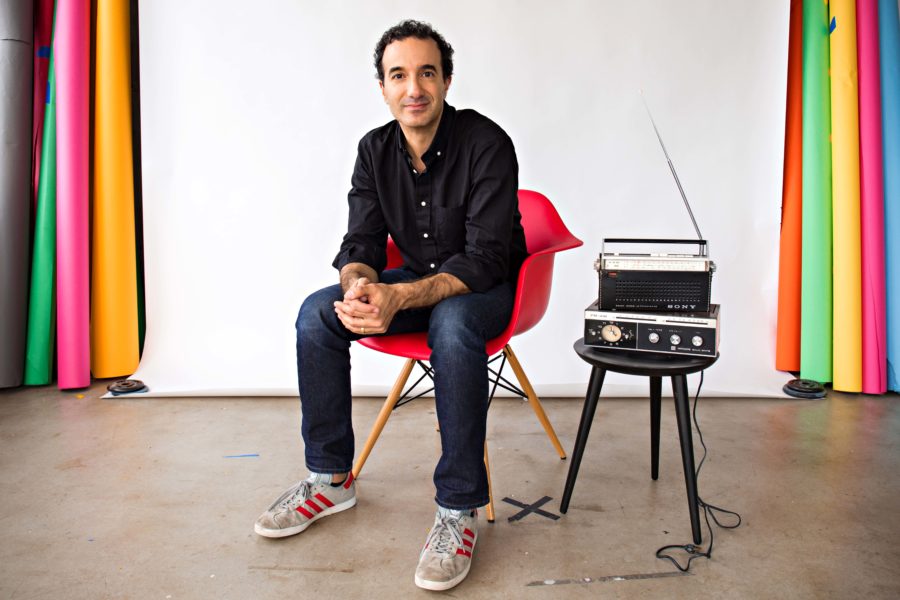Whether you’re just starting an ecommerce business or considering a rebrand, one of the most…
6 Things We Learned from Radiolab’s Jad Abumrad

Every day, our 700+ employees work hard on the world’s largest marketing automation platform. So when the end of the week rolls around, we take the opportunity shut down our laptops, load up on donuts and coffee, and give our brains a good stretch with Coffee Hour.
Coffee Hour is a series that invites thought-provoking speakers to tell us about what they do and teach us something new. Recently, that included Radiolab’s own Jad Abumrad. Jad’s background is rich in innovative pursuits: He’s written music for films, and he’s reported and produced documentaries for local and national public radio programs such as On the Media, Morning Edition, All Things Considered, and WNYC’s 24 Hours at the Edge of Ground Zero.
While at WNYC, Jad dabbled in a new idea—one that would become one of world’s most beloved and downloaded shows today: Radiolab. Not only that, Jad is executive producer and creator of Radiolab’s More Perfect, a popular podcast about the Supreme Court.
Here’s what we learned from his Coffee Hour:
Gut churn is weird, but good.
When Jad consulted his Radiolab co-creator, Mikel Ellcessor, about what he remembered about the show’s beginnings, Mikel put it succinctly: gut churn. For years and years, the pair was faced with tough day-to-day questions about how they were going to get their show made. “It was a long time before we were able to answer those questions. So in that big in-between space is where all that gut churn was, because you just had to sit with it. It wasn’t like plans and strategies. It was gastric acid.”
It might take a while to find your voice.
“I find myself in the studio staring at that microphone, and every time that I would open my mouth to speak, my brain would go totally haywire,” Jad says. He wanted to be intimate like Scott Simon, edgy like Joe Frank, have gravitas like Walter Cronkite, or be authentic like Ira Glass. But every time he tried to speak, he would hear someone else’s voice. But while it may be discouraging, he also said this is all part of the process. Embrace it and grow.
Making stuff is hard…
“I’ve been doing this now for 16, 17 years, and I still have this experience every time I’m in front of a mic,” he says. The only thing that’s changed, he says, is how long it takes for him to cross into something that feels real. It used to take him 2 hours, but now he can make the journey in about 5 minutes. “But that discomfort is always there,” he adds.
…but making more stuff makes making stuff easier, sort of.
Jad cites an idea from Ira Glass: If you do creative work, what you’re making at first isn’t good, but your taste is very good. And your taste is what tells you that what you’re making falls short of what it could be. Everybody goes through it. To combat it, you should do a large volume of work to catch up and close that gap so that the work you do is as good as your ambitions. “On the one hand, your taste is killer,” he explains. “You’ve got these grand ambitions of all the things you’re going to do. On the other hand, [you’ve got] this keen awareness that you suck.”
Even in moments of doubt, you’ve gotta commit.
How do you keep going so you don’t get stuck in the void of being lost? That became a key question for him, Jad says. And for those of us who struggle every day, there’s some comfort in his response. “The truth is, I don’t know the answer,” he admits. “It’s something I’m constantly struggling with and wondering about.”
Choir people are amazing.
A couple of years ago, Radiolab did a piece on color and how dogs, people, and mantis shrimp see it. Since they couldn’t depict it visually, the team stumbled across the idea of demonstrating each creature’s visibility using music. Then they tapped a choir to help them out. “They’re the nicest, most generous people on the planet,” Jad says of choir folks. “If you take nothing else from this talk, I have given you that.”
Original article written by Kasia >






